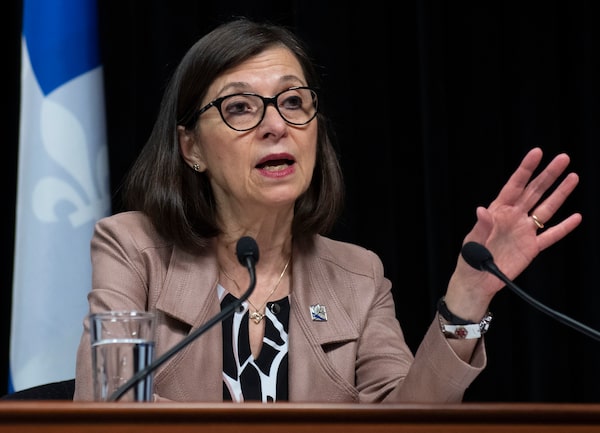
Quebec Health Minister Danielle McCann signed an order late last week to redeploy education workers to the province's health sector. Ms. McCann is shown here at the legistlature in Quebec City on April 11, 2020.Jacques Boissinot/The Canadian Press
A Quebec government decree that redeploys educational workers to the health sector, overriding collective agreements, has raised concerns among teachers and school boards.
Health Minister Danielle McCann signed an order late last week that she said would mean using nursing instructors, for example, in long-term care homes. However, the decree is broad and unions worry that it could also affect custodial staff and see teachers performing administrative tasks and answer phones.
Quebec is grappling with the COVID-19 crisis at its government-owned and private long-term care homes. No other province has issued similar orders for its education employees.
“There are people there who, in my opinion, will make a contribution that will be really appreciated in long-term care centres,” Ms. McCann told reporters on Friday. “It’s for those people, for the long-term care centres, that we are making this request because in our ranks we’ve tapped everyone that we could tap.”
The province’s largest teachers’ union, representing 125,000 education workers, said news of the order is creating a lot of anxiety for its members, and it was unable to reassure them.
“There are a lot more questions than answers. It’s certainly not the right way to keep public sector workers engaged and motivated to fight together against the coronavirus," Sonia Éthier, president of the Centrale des syndicats du Québec, said in an e-mail statement on Monday. "We are still waiting details from the government regarding the priority of those who will be mobilized: Who, when and where?”
Schools across the country have temporarily closed their doors in a bid to stop the spread of COVID-19. Premier François Legault suggested on Friday that school could resume in the province before May 4, but apologized over the weekend, saying that he would not put students and staff at risk.
Education workers in several provinces, including Quebec, are working in daycare settings to watch the children of essential workers. Quebec’s decree takes that work a step further, and moves employees to a sector where they do not necessarily have the training, according to unions and school board associations. A spokeswoman for Ontario’s Education Minster Stephen Lecce said that province is not considering a similar approach at this time for its education workers.
Heidi Yetman, the head of the Quebec Provincial Association of Teachers, which represents English-sector teachers in the province, said her understanding is that education workers could be called upon in regions with fewer backup health care workers.
She said the government can override collective agreements in an emergency situation, but she worries about the training for education workers who are redeployed to health.
“The collective agreement for me is the Bible. And anything that comes in and affects that really is disturbing,” said Ms. Yetman, who is also a high-school teacher. “The power that the government has to do something like this is really concerning.”
Russell Copeman, executive director at the Quebec English School Boards Association, said he would have preferred the government put out a call for volunteers, as opposed to signing a ministerial order.
“It seems to be quite a heavy-handed measure and I think that’s what has us concerned.”
Mr. Copeman added: “I heard someone say we’re at war. Well, perhaps we are at war with this virus. But even in time of war, you don’t send untrained people onto the battlefield. You’ve got to give them the right protection and the right training.”
However, Caroline Coulombe, a professor in the school of management sciences at the University of Quebec at Montreal whose research includes organizational crisis management, said the government needs to put in place “exceptional responses” – and that means deploying health instructors to help within the health sector.
“In time of crisis, organizations need to display both flexibility and strong leadership, both at the same time,” Prof. Coulombe said.
She added: “Let’s collaborate through exceptional measures while staying aware that is meant for exceptional times, not for the [remainder] of our lives.”
With files from Tu Thanh Ha and Les Perreaux.
Our Morning Update and Evening Update newsletters are written by Globe editors, giving you a concise summary of the day’s most important headlines. Sign up today.
 Caroline Alphonso
Caroline Alphonso